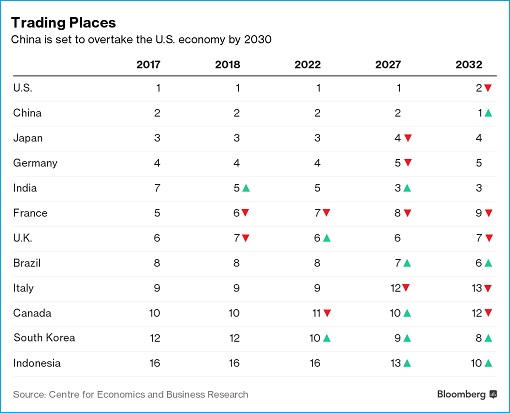By 2032 – that’s another 14 years – China is projected to become the world’s new biggest economic powerhouse, overtaking United States of America. But the Chinese are not the only winner. By 2027, the Indians will surpass Germany’s economy to claim the third prize. And as early as next year, India will become the world’s fifth-biggest economy, leaving behind U.K. and France.
That’s according to a report by CEBR (Centre for Economics and Business Research) in London. Of course, depending on which report or research you desire, China has already overtaken the U.S. But not many economists agree as majority of Chinese populations are still poor. Analysts would use PPP (purchasing power parity), per-capita numbers or even Big Mac Index to argue their own case.
Hence, while a party argues that the same McDonald’s burger costs 1.8 times more in the U.S. than China, another party argues that the Chinese economy continues to grow at a rate of more than 6% while the Americans is just at 2%. Regardless, everyone agrees that China will become the world largest economy, if the Middle Kingdom has not already done so.

Not only China will surpass America by 2032, the CEBR report also reveals that in the same year, three of the four largest economies will be Asian – China, India and Japan. Presently, the Chinese is at No. 2 spot while the Japanese is the world’s third largest economy. By 2027, Japan would be bumped to 4th place by India while Germany would lose a spot to 5th place.
Also by 2032, South Korea and Indonesia will enter the top 10 largest economy, replacing the Group of Seven nations of Italy and Canada. South Koreans, currently No. 12, will climb to 10th slot (2022) and subsequently 9th place (2027) and 8th place (2032). Indonesia, meanwhile, will improve from the present 16th place to 13th (2027) and 10th place by 2032.
However, some analysts such as Tim Worstall at Forbes has good news for the U.S. It doesn’t matter even if China is already the world’s biggest economic powerhouse. What’s important is how well people live – the economic output per capita. That’s total economy divided by the number of people who get to consume the output.

In this context, the U.S. is miles ahead with US$50,000 a year while it’s only US$5,000 a year in China. In other words, China would take 3 generations of breakneck growth to close that gap. In short, the people of the U.S. are richer than the Chinese, which in turn could collect more taxes to maintain U.S. military superiority. Does that sound too arrogant and ignorant?
Well, another analysis by British BBC had also called for calm when IMF declared in 2014 that for the first time in 140 years, the U.S. has lost the title of the world’s largest economy – stolen by China. The argument was that thanks to China’s huge population – 1.4 billion people – its total economic output was actually disappointing, instead of impressive.
Additionally, the West thinks the U.S. should relax as the Chinese economic data is notoriously unreliable because the Chinese Communist Party has been cooking books to produce sexy numbers in order to impress its own people. Beijing was also accused of practicing corruption thus the data-gathering techniques are highly questionable.

Hmm, if China is indeed 3 generations away from reaching the level of prosperity that the U.S. enjoys now, then President Trump should not be too worry about Chinese stealing jobs from the Americans, should he? In the same breath, Germany, France, United Kingdom and Japan should have very little to worry even if India wins the world’s third largest economy trophy.
Other Articles That May Interest You …
- Robert Kuok – How Chinese Become Amazing Economic Ants Despite Poverty & Discrimination
- Challenging The US Dollar – Soon, China Will Buy Saudi’s Oil Only In Yuan
- Killing The US Dollar – China And Russia Getting Out Of Greenbacks Control
- Watch Out US, Japan, India – China Launches Asia’s Biggest Type 055 Destroyer
- China Is Terrified – Trump Has The Power & Ability To Screw Its Economy
- Sorry Colonial Master Britain, India Is Now The World’s 6th Largest Economy
- These 8 Charts Show How China’s Economy Meltdown Spreads To The World

|
|
December 29th, 2017 by financetwitter
|


|

|

|

|

|

|




























Comments
Add your comment now.
Leave a Reply